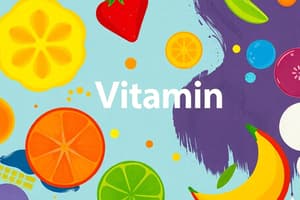Podcast
Questions and Answers
What was the original name given to vitamins by Casimir Funk?
What was the original name given to vitamins by Casimir Funk?
- Nutritamines
- Vitalamines
- Vitamins
- Vitalamin (correct)
Which of the following vitamins is classified as fat soluble?
Which of the following vitamins is classified as fat soluble?
- Vitamin B1
- Vitamin K (correct)
- Vitamin B12
- Vitamin C
Which statement accurately describes water soluble vitamins?
Which statement accurately describes water soluble vitamins?
- They must be consumed daily. (correct)
- They are insoluble in water.
- They do not affect chemical reactions in the body.
- They can be stored in the body's fat.
According to the classification, which mineral statement is false?
According to the classification, which mineral statement is false?
Which of the following vitamins is known as the 'sunshine vitamin'?
Which of the following vitamins is known as the 'sunshine vitamin'?
What distinguishes fat soluble vitamins from water soluble vitamins?
What distinguishes fat soluble vitamins from water soluble vitamins?
Which of the following is a water soluble vitamin?
Which of the following is a water soluble vitamin?
What essential role do vitamins play in the body?
What essential role do vitamins play in the body?
What characteristic distinguishes fat soluble vitamins from water soluble vitamins?
What characteristic distinguishes fat soluble vitamins from water soluble vitamins?
Minerals provide energy directly to the body.
Minerals provide energy directly to the body.
Who is known for discovering vitamins and initially named them 'vitalamine'?
Who is known for discovering vitamins and initially named them 'vitalamine'?
Vitamin C is also known as __________.
Vitamin C is also known as __________.
Match the vitamins with their classification:
Match the vitamins with their classification:
Which vitamin is also known as the anti-stress vitamin?
Which vitamin is also known as the anti-stress vitamin?
Fat soluble vitamins must be consumed daily.
Fat soluble vitamins must be consumed daily.
What are the two main classifications of vitamins?
What are the two main classifications of vitamins?
Vitamins are organic compounds necessary for good health and __________.
Vitamins are organic compounds necessary for good health and __________.
What is the main reason water soluble vitamins need to be consumed daily?
What is the main reason water soluble vitamins need to be consumed daily?
Flashcards are hidden until you start studying
Study Notes
History of Vitamins
- Vitamins were discovered in the 20th century and are considered essential nutrients.
- Polish chemist Casimir Funk identified a link between diets lacking certain compounds and disease, naming the water-soluble substance "VITALAMINE," later shortened to "VITAMINE."
- The term "vitamine" originally suggested an amine was necessary for life, but was modified when it became clear that not all vitamins are amines.
Vitamins Overview
- Vitamins are organic compounds essential for health and vitality.
- They are carbon-containing substances required in minute amounts for regulating body processes and maintaining life.
Classifications of Vitamins
Fat Soluble Vitamins
- Soluble in fats and fat solvents, but insoluble in water.
- Require sufficient body fat for utilization and can be stored in body fat.
- Do not need to be consumed daily.
- Includes:
- Vitamin A (Retinol)
- Vitamin D (Calciferol or Sunshine vitamin)
- Vitamin E (Tocopherol or Alpha tocopherol)
- Vitamin K (Koagulation vitamin)
Water Soluble Vitamins
- Soluble in water and cannot be stored in the body; excess is excreted.
- Should be consumed daily.
- Includes:
- Vitamin B1 (Thiamine)
- Vitamin B2 (Riboflavin)
- Vitamin B3 (Niacin/Nicotinic Acid)
- Vitamin B5 (Pantothenic Acid or Anti-stress vitamin)
- Vitamin B6 (Pyridoxine)
- Vitamin B7 (Biotin or Egg white injury factor)
- Vitamin B8 (Inositol)
- Vitamin B9 (Folic Acid)
- Vitamin B12 (Cobalamin)
- Vitamin B4 (Choline)
- Vitamin C (Ascorbic Acid)
Minerals Overview
- Minerals are simple inorganic elements that do not provide calories and leave ash when burned.
- They are crucial for various bodily functions and act as organic catalysts indirectly supplying energy.
- Comprise approximately 4-6 percent of total body weight.
History of Vitamins
- Vitamins were discovered in the 20th century and are considered essential nutrients.
- Polish chemist Casimir Funk identified a link between diets lacking certain compounds and disease, naming the water-soluble substance "VITALAMINE," later shortened to "VITAMINE."
- The term "vitamine" originally suggested an amine was necessary for life, but was modified when it became clear that not all vitamins are amines.
Vitamins Overview
- Vitamins are organic compounds essential for health and vitality.
- They are carbon-containing substances required in minute amounts for regulating body processes and maintaining life.
Classifications of Vitamins
Fat Soluble Vitamins
- Soluble in fats and fat solvents, but insoluble in water.
- Require sufficient body fat for utilization and can be stored in body fat.
- Do not need to be consumed daily.
- Includes:
- Vitamin A (Retinol)
- Vitamin D (Calciferol or Sunshine vitamin)
- Vitamin E (Tocopherol or Alpha tocopherol)
- Vitamin K (Koagulation vitamin)
Water Soluble Vitamins
- Soluble in water and cannot be stored in the body; excess is excreted.
- Should be consumed daily.
- Includes:
- Vitamin B1 (Thiamine)
- Vitamin B2 (Riboflavin)
- Vitamin B3 (Niacin/Nicotinic Acid)
- Vitamin B5 (Pantothenic Acid or Anti-stress vitamin)
- Vitamin B6 (Pyridoxine)
- Vitamin B7 (Biotin or Egg white injury factor)
- Vitamin B8 (Inositol)
- Vitamin B9 (Folic Acid)
- Vitamin B12 (Cobalamin)
- Vitamin B4 (Choline)
- Vitamin C (Ascorbic Acid)
Minerals Overview
- Minerals are simple inorganic elements that do not provide calories and leave ash when burned.
- They are crucial for various bodily functions and act as organic catalysts indirectly supplying energy.
- Comprise approximately 4-6 percent of total body weight.
Studying That Suits You
Use AI to generate personalized quizzes and flashcards to suit your learning preferences.




